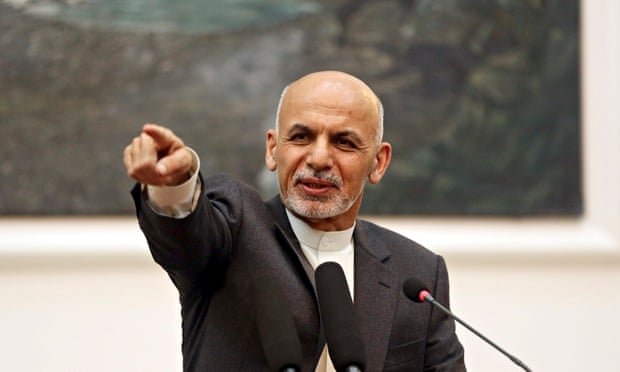 It would be a challenge for any leader: balance the books after years of systemic corruption, battle a resurgent rebellion and form a government despite entrenched ethnic divisions. But Afghan’s new president, Ashraf Ghani, must do all this as thousands of foreign troops pull out, taking their services, experience, hardware and dollars with them.
It would be a challenge for any leader: balance the books after years of systemic corruption, battle a resurgent rebellion and form a government despite entrenched ethnic divisions. But Afghan’s new president, Ashraf Ghani, must do all this as thousands of foreign troops pull out, taking their services, experience, hardware and dollars with them.
Ghani’s most pressing task at a summit with international donors in London on 3-4 December may be to make sure the world does not forget Afghanistan once foreign soldiers are no longer fighting on its soil.
Nato troops are due to withdraw from Afghanistan by 31 December. From a peak of around 140,000 in 2011, the force will shrink to 12,000 soldiers, who will stay mainly to train Afghan security forces.
The withdrawal leaves Afghanistan more vulnerable to Taliban insurgents, who have been gaining ground this year, and deprives the economy of the benefits of having tens of thousands of foreign troops stationed in the country.
“The Afghan economy is a war bubble and we are seeing it slowly deflate,” says Graeme Smith, senior analyst at International Crisis Group. He says the budget deficit was $300m-750m, with security costs eating up around $650m of the government’s meagre funds.
“If the Afghans were not paying that … to fight the war which, to be frank, we started, then most of these budgetary pressures would disappear overnight,” he says. “While we’re putting Afghanistan through these shocking political and military transitions, it behoves us to try to ease the economic transition, to smooth the way with some cash.”
However, many international partners are disillusioned after 13 years of rampant administrative corruption. Although Ghani represents a new start after Hamid Karzai’s discredited presidency, it is not clear yet whether this will be enough to guarantee continued, long-term financial support.
At the London conference, Afghanistan and its international partners are meant to review progress against the 2012 Tokyo mutual accountability framework, which includes commitments on governance, democracy, finance and rights.
Omar Samad, a former Afghan ambassador to France and Canada, says Ghani may want to recast some of these commitments to try to make aid more effective and accountable.
“This is going to be seen by the new Afghan government as an occasion to renew ties with the international community and to receive strong political and … development support for [its] agenda,” Samad says.“It’s a very critical moment because the glass is seen as half-full from the Afghan side. We need to solidify the gains of the last 13 years but we also need to enhance and … grow in a sustainable manner.”
There is real fear of gains being lost in the sphere of women’s rights, with activists warning that women could be excluded from future peace talks with the Taliban, endangering their status and protection. Peace talks are seen as inevitable despite a decade of failed negotiations with the insurgents, who are partly funded by profits from the illegal opium trade, which fuels corruption and subverts the legal economy.
Aid groups have urged British and Afghan authorities to make it clear in London that women’s rights are non-negotiable. The main conference meeting on 4 December will be preceded by a civil society event – the Ayenda conference, which means “future” in Dari – on 3 December. Britain’s Department for International Development said it expects women to be actively involved throughout the two days.
The withdrawal of most Nato troops has triggered soul-searching about the achievements of a military mission that cost billions of dollars and thousands of lives, including 2,210 American and 453 British soldiers.
Ghani, too, may be reassessing his options, with some signs that he may turn increasingly to China, which has signalled willingness to take a more active role in Afghanistan, with which it shares a narrow, mostly impassable, border.
“Ghani is making a very rational move by reaching out to China, not only because China has legitimate economic interests in Afghanistan and Afghanistan desperately needs new economic partners, but also because of China’s significant sway over Islamabad, and Islamabad’s very significant influence over the [Taliban] insurgency,” Smith says.
Samad says the greatest gains since 2001 include the creation of greater political, economic and social spaces, especially for women and young people. But governance and rule of law are still lacking, infrastructure projects are not well thought out, and there is a middle-management skills gap.
The troop withdrawal will affect every aspect of life: Smith says there will no longer be demand for armies of trucks to carry gravel, diesel or other inputs to military bases, and construction activity is expected to slow.
David Haines, country director forMercy Corps, says employment rates among people who have completed the aid group’s vocational training in Helmand province have already dropped significantly for men and dramatically for women this year as fighting raged and business slowed.
He hopes the London conference will underline international support for Ghani to allow him “to get his house in order” over the next few years. “If he has to try and negotiate peace with the Taliban, deal with a massive falling economy, deal with corruption and a lack of accountability of public servants … it’s an impossible task to ask of anybody,” he says.
Smith says history has shown that when troops pull out of a country, funds tend to follow. “When you don’t have fresh-faced British soldiers whose lives are at risk, it’s much easier to turn off the tap. And that’s the real danger now for Afghanistan: that the world will forget.”

No comments:
Post a Comment